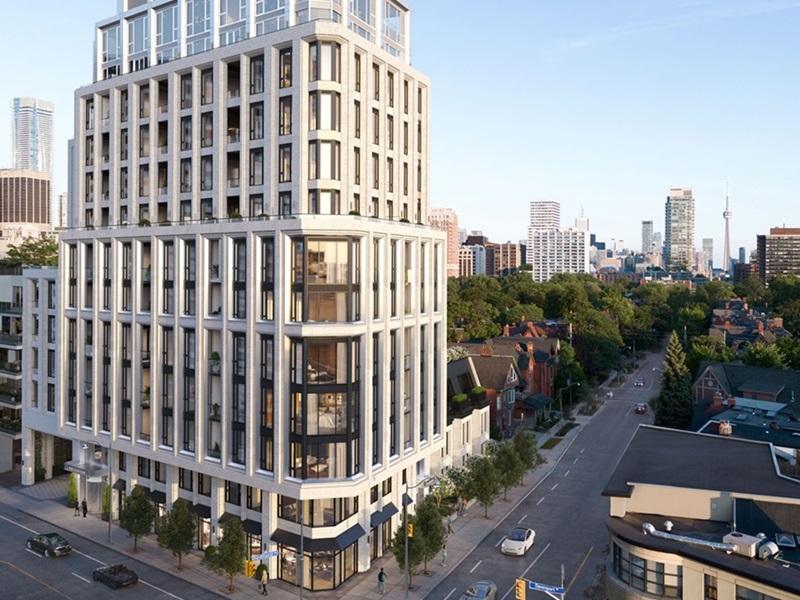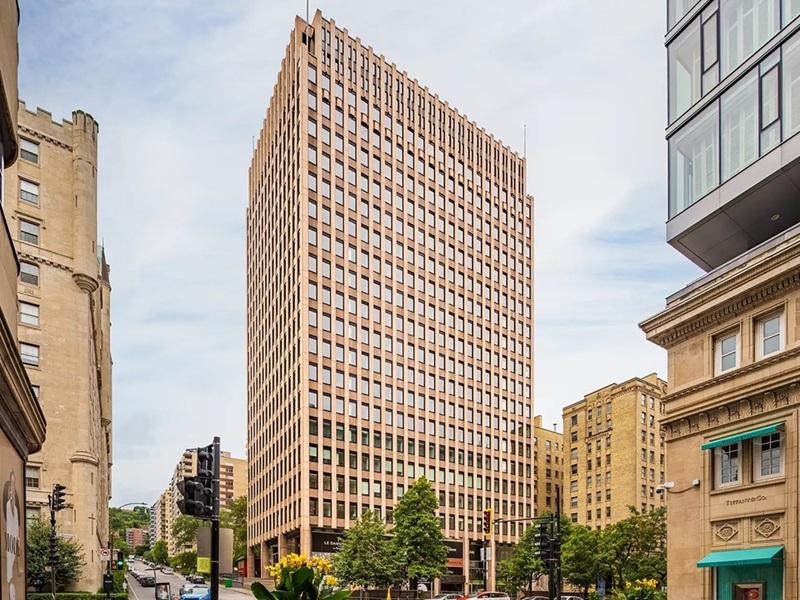
The retail atrium of The Well in Toronto. (Courtesy CBRE)
Toronto’s streetfront retail leasing and transaction activity is in better shape than many people probably think, according to CBRE.
Retail leasing deals were up 60 per cent from Q1 to Q2 2021 and the momentum has continued to grow as pent-up demand is being unleashed.
“There’s been more leasing in the past 60 days than probably in the past year-and-a-half,” CBRE executive vice-president and leader of the urban retail team Arlin Markowitz told RENX.
Markowitz said he’s been hosting representatives from New York City looking to lease retail space on a weekly basis in Toronto’s high-end Bloor and Yorkville area since fully vaccinated Americans were allowed to enter Canada without quarantining on Aug. 9.
“Before that, there was a lot of activity and a lot of people who were looking and close to making an offer for leasing a property, but they couldn’t sign a deal before coming personally,” said Markowitz. “When they came, the deals happened.
Retail rents have dropped
“In a lot of segments of the market it’s been more attractive for retailers to enter because the rents have changed. In some areas, rents have come down which is giving retailers the opportunity to become more profitable.”
Retail rents are down 20 to 25 per cent from pre-pandemic levels in certain parts of Toronto, according to Markowitz, and retailers want to lock up space now because they’re unsure how long the discounted rates will remain.
“With anything under 2,000 square feet, rents typically aren’t changing too much,” said Markowitz. “We’re seeing the most movement in larger stores.”
Some of the larger recent lease deals Markowitz cited include: a 25,000-square-foot Nike store at Yorkdale Shopping Centre; a new Apple store of almost 20,000 square feet at The One at Yonge and Bloor Streets; and a 12,000-square foot LCBO store in the Manulife Centre.
Retail leasing at The Well
The Well mixed-use development in the western part of downtown will have 420,000 square feet of space for retail and food services. RioCan REIT has used CBRE’s assistance to lease 110,000 square feet to date.
Markowitz said fitness club Sweat and Tonic is taking 24,000 square feet. A major restaurant group has leased 78,000 square feet for six different restaurants in various parts of The Well.
Shoppers Drug Mart has leased 16,000 square feet while 10,000 is going to tenants that cater to everyday needs such as banking and barista-style coffee. Other retailers are close to signing leases at The Well, Markowitz added.
Markowitz said The Well’s concourse food hall and market will be larger than 65,000 square feet.
“It’s like the St. Lawrence Market on steroids. It’s going to be something that nobody in Toronto has ever seen before. That’s the true anchor of The Well and it’s super exciting.”
Other hot retail areas
The area around Yonge Street and Eglinton Avenue is also hot, since there’s so much high-rise development taking place in the neighbourhood that will increase foot traffic and benefit retailers.
“That’s not necessarily going to translate into a fashion district, but retailers in the service and food and beverage industries can really thrive in a place like that because the sheer volume of humans living, working and walking around there is going to be incredible,” said Markowitz.
Ossington Avenue between Queen and Dundas Streets has been resilient through the pandemic, including a strip of five European-inspired boutique shops of less than 1,500 square feet each from 46 to 54 Ossington owned by Hullmark.
They include jeweler Melanie Auld, skincare company Fig and Mandy’s Gourmet Salads, all of which are Canadian brands.
“I attribute some of Ossington’s recent success to some of the landlords purposefully creating small shops,” said Markowitz. “That’s something that’s really been moving well in the marketplace.”
Retail property transactions are increasing
While Toronto streetfront retail investment hit bottom in Q2 2020, down 35 per cent from a year earlier, Q1 2021 was among the most active on record with $181 million in properties traded. Not all are pure retail plays, however.
“On the investment side of our business, we’re absolutely seeing people working on assembling properties to put together lands that are big enough for redevelopment for mixed-use projects that are primarily focused on residential, whether it’s purpose-built rentals or high-rise condominiums,” said Markowitz.
“Landlords that own storefronts on any of our high streets — like Bloor, College, Queen, St. Clair, Yonge or Dundas — typically didn’t want to sell their buildings, especially when there were tenants in there paying rent.
“But all of a sudden there became more of an opportunity to get these guys to sell because they were sitting with vacancies. It did create an opportunity for people to buy buildings and assemble sites.”
Land and building prices have continued to rise in Toronto because the multifamily market has been resilient through COVID-19 and condominium sales are booming again after a lull at the height of the pandemic when there was what Markowitz called a “small and overhyped exodus to the suburbs.”
Vaccination passports will help
Markowitz has observed more people returning to offices in the downtown financial core, which in turn has increased traffic at food courts and restaurants. He expects that to continue despite COVID-19 case counts rising again due to the spread of the Delta variant.
Vaccinations have proven effective and there’s a better understanding of the virus now than a year ago.
Many landlords and tenants are also working together more closely and cooperatively, and protections have been put in many leases whereby landlords offer tenants a significant break on rents in the event of another government-mandated lockdown.
Building owners want to keep tenants in place to help them keep paying their mortgages and property taxes.
“If there’s another lockdown they’re both going to suffer, but they’re going to share in the suffering together and should both survive,” said Markowitz. “It’s not just going to be one person sharing the brunt of the whole problem.”
The introduction of vaccine passports in Ontario will be a “game-changer,” according to Markowitz, since they should make people feel more comfortable dining inside, going to gyms and shopping in stores.
While Markowitz and his team focus on Toronto, they do some work in Vancouver and Montreal and he said retail activity in those cities has also been positive. He cited the Barry’s Bootcamp fitness centre brand opening in Vancouver, and planning to do the same in Montreal, as encouraging signs.











